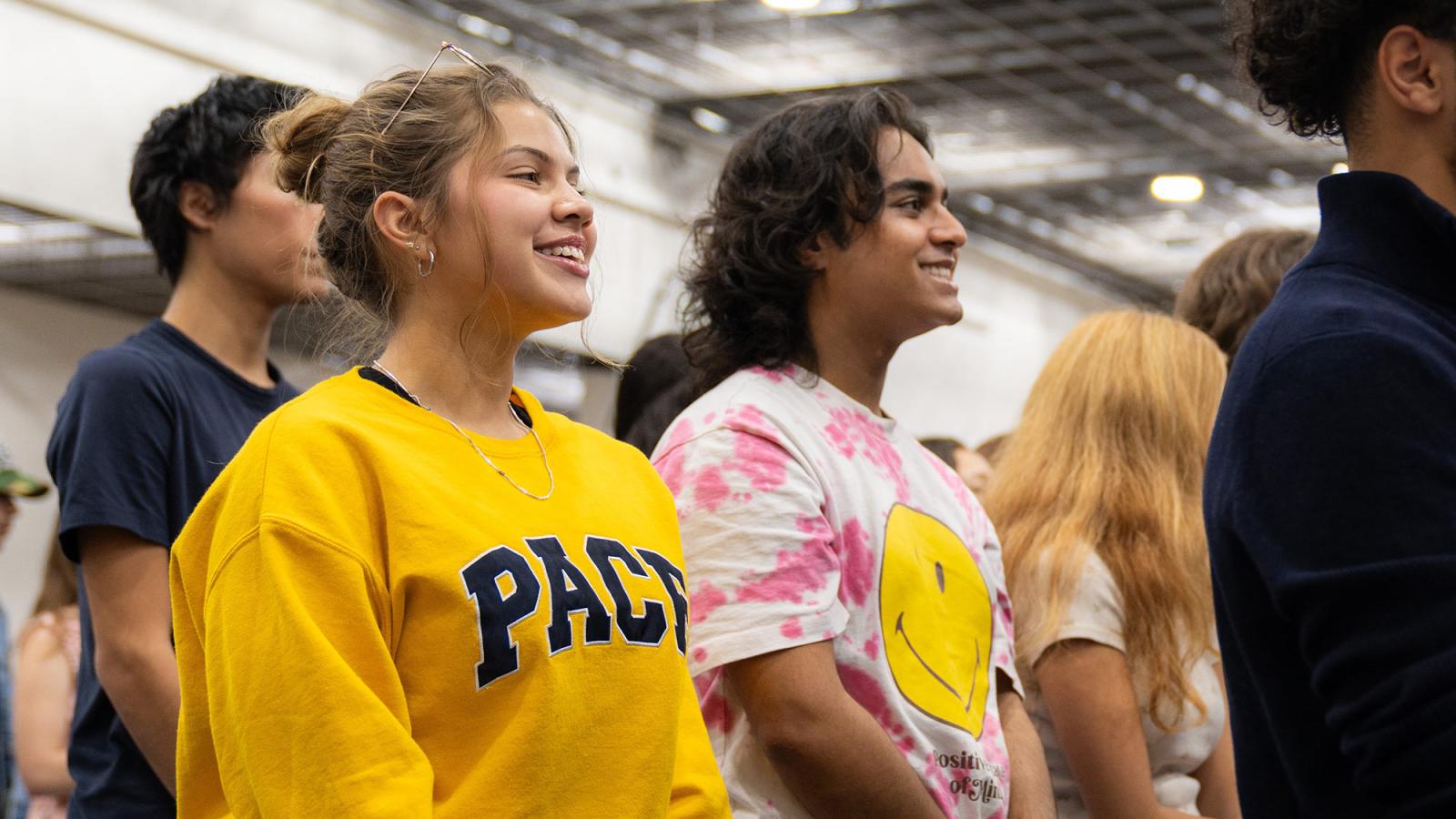Pace University Art Gallery is pleased to present Summer Remembers Winter, a solo exhibition by painter Siobhan McBride. The exhibition explores disjointed spaces, memory, and experiences shaped by dislocation and opens for viewing on Saturday, February 14 with a free public reception on Thursday, February 19, from 5:00 p.m. to 7:00 p.m.
Press Release: Pace University Welcomes Class of 2028 at Convocation

New class, comprised of 2,348 incoming students from 64 countries, shows growth in nursing, criminal justice, psychology, and computer science
An eventful week of fun-filled festivities and students returning to campus culminated Tuesday when Pace University welcomed its Class of 2028 during its Convocation.
In separate ceremonies – one at its campus in lower Manhattan followed by another at its Pleasantville campus in Westchester County – the Pace community welcomed 2,348 new and transfer students hailing from 49 states and 64 countries.
Applications to Pace were up 5 percent this year, with 32,650 applications across campuses. The incoming class has demonstrated significant growth in academic areas such as nursing, health sciences, biology, business economics, criminal justice, psychology, accounting, management, finance, and computer science. This growth reflects the university's commitment to academic achievement and innovative programs that prepare students for professional careers. In Pleasantville, enrollment was up by 13 percent over last year.
Pace’s motto of Opportunitas, or creating opportunities for students, was a central theme. President Marvin Krislov encouraged students to explore new ideas, to engage with them, and to not shy away from trying new experiences.
“Remember: the opportunities at Pace are vast,” President Krislov told the packed rooms. “I challenge you to explore beyond your comfort zone. Join new clubs, meet different people, and embrace all that this vibrant community has to offer. These experiences will enrich your Pace Path and your personal growth.”
In addition to President Krislov, Interim Provost Jonathan Hill, Associate Provost for Student Success Hillary Knepper, and Chief Diversity Officer Stephanie Akunvabey each provided warm welcomes and words of wisdom to the diverse group of students.
New York City’s Student Government President George Davis encouraged the incoming class to get involved and seize every opportunity available to them as Pace’s respective classrooms and curriculums extend far beyond campus.
“The themes that thread my experiences together are to embrace the unknown, say yes as much as you can, and enjoy the journey,” Davis said. “Embrace the unknown by playing the cards you’ve been dealt to the best of your ability and seek out new opportunities -- who knows what you’ll discover. Saying yes more than no does not mean overbooking yourself or becoming overwhelmed, rather taking the initiative to carve out your ideal experience here in the greatest city on earth.”
Pleasantville’s Student Government President Nicholas Diaz shared stories from his Pace journey and highlighted the importance of having a supportive community.
"In only the two years that I have been at Pace, I have seen how close of a unit the Pace community is and how we thrive with support,” Diaz said. “Whether that's cheering at a football game or showing up to an event, when it really counts there will always be someone at Pace who will show up for you.”
“I came to Pace for the business opportunities, the close distance to New York City and to play field hockey,” said Chloe Gilroy, a first-year finance major from New Hampshire. “I thought Convocation was great: I am really looking forward to the opportunities here -- the clubs and the classes.”
Nursing continues to be a draw for talented students eager to work in the region’s robust healthcare sector. The program’s recent pass rate of 98% on the national licensing exam underscores the high-quality education and training that students receive at Pace.
“Becoming a nurse has always been my goal, and I’m excited to learn and grow in my nursing classes,” said Briana Perez ’28, a nursing major from Brooklyn, New York. “Helping others is my passion, and I know Pace will help me become the best nurse I can be.”
About Pace University
Since 1906, Pace University has been transforming the lives of its diverse students—academically, professionally, and socioeconomically. With campuses in New York City and Westchester County, Pace offers bachelor, master, and doctoral degree programs to 13,600 students in its College of Health Professions, Dyson College of Arts and Sciences, Elisabeth Haub School of Law, Lubin School of Business, Sands College of Performing Arts, School of Education, and Seidenberg School of Computer Science and Information Systems.


